Dear Friends,
A few days ago I was part of a reading and conversation here in Provincetown: The Lost Edge of Bohemia. Was Provincetown ever Bohemian? Was it still? How did we feel about the word and its meanings?
We were brought together by through bonds of friendship and love, some going back decades. Six poets: Kathe, me, Eileen Myles, Pat Kearns, Oona Patrick, and Mackenzie. We all felt the edge. The edge like a shore, always changing.
There is a vision, in the idea of the “Bohemian,” of how the world could be, should be. In the world that it imagines, everyone lives according to their deepest desires.
What I remember of my early years in Provincetown back in the mid-’80s, back in the ‘90s: I was living life but at the same time trying to invent life, trying to make with my own body a future full of my imaginings. It felt as if we could reach some pitch of living where we congregated in great pods like whales do, singing and singing. To feed, we would only have to open our mouths.
I wrote this for Kathe and the poets, but I didn’t read it. It wasn’t ready, or I wasn’t. Instead I read some other paragraph poems, including one I had published here not long ago, “A Spell for You.”
Bohemia is an idea that lives just out of reach. Yet if Bohemia is what we lost, then it is also what we were, and everything we were stays in us even as we are always losing it.
— Sal
¶ The Lost Edge of Bohemia
Where are the singing poets and where are the cold poets and where are the poets at play in language? Where are the prayers and the incantations? The invocations are spoken into the bare earth and the earth remains bare. What was it, exactly, that we loved? Whatever it was that we loved, we loved it more than money. What money meant was freedom and what freedom meant was love and art — a tangle of contradictions. We didn’t know any better. It seemed like the new life and obviously we were living it. It was always a fantasy it was always a romance, a seduction of time. It’s hard out there. I’m never as free as I want to be. And I will return to the house and return to the bed. And I will sleep and wake again. And I need to know. I am looking at my open hand, the palm meeting space and space extending everywhere. What they can only accept. What the music asked of me. Beside me on the couch, an open book. Does it matter where the poems went? Between the hand and ear, between the morning and the end, between what is gotten and what is left.
This is Kathe’s image for the event, one that is still haunting me.
I’d love to hear from you! Let me know what you think or how you are feeling. What are your deepest desires, and what have you lost?
Further adventures and new ways of seeing can be found in my book, The Uses of Art.
Artist Sal Randolph’s THE USES OF ART is a memoir of transformative encounters with works of art, inviting readers into new methods of looking that are both liberating and emboldening.
Dazzlingly original, ferociously intelligent.
— Michael Cunningham
A joyful, dazzling treasure-box of a book.
— Bonnie Friedman
Here’s a guide, to waking up, over and over again.
— Roshi Pat Enkyo O’Hara








I love this & you of course. What a day, what a life. "I am never as free as I want to be" I am stealing this. Yesterday I was driving in the dunes & there was a little girl sitting in the front seat next to me. It was her birthday & as we got to the beach she asked if she could take her seat belt off & as I drove down the beach, she leaned her body out the window & kept saying "this feels like freedom"
Another serendipidous post, Sal! And a beautiful piece of writing.
The word 'bohemia' re-entered my consciousness just recently when I finally got hold of Alain de Botton's book from 2004 called Status Anxiety. A dear friend has been patiently listening to me share all my worries about the exposure and risks of self-publishing and she said I should read the de Botton's book because I was not thinking straight about what matters and who we are. The final chapter in the book (do you know it?) talks about how bohemianism has always opposed the normal markers of success i.e. wealth, status, property, fame, etc and instead used the richness of life and the value of art to describe a good life and a person who has succeeded. This helped me!!
These are the values I think you are celebrating here. It's so hard when we are all living in the glare of social media (and many are facing real financial hardship) but I would like to say (and believe!) that the real values of life are community, creativity of all kinds, and harmony with nature.